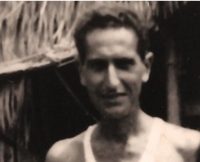If it didn’t bode so threateningly for the future, the new situation would be highly comical. In front of the Bay
View Hotel, where “third parties” go to register, a great many Jews can be found, proudly showing their German passports — the very same ones who, in order to avoid internment by the American authorities a few days before, were showing themselves to be more anti-Nazi than the Americans themselves. Here I find F.R., formerly so satisfied with her British passport. She has procured for herself a certificate from the Russian Club establishing that she is Russian, and on the form that she filled in before my very eyes, she writes the name of her first husband who was Russian, carefully refraining from mentioning the second, an Australian. Through her I learn that V., who until now passed as a good citizen of the Republic of the United States, has escaped internment in Santo Tomas by pretending to be Austrian — he is is in fact an Austrian Jew. As for his exuberant wife, she has suddenly become Filipino. The two of them, both before and at the outbreak of the war, used to parade their American patriotism with the insolence of the new rich, while displaying a distrust of foreigners that was nearly always unjustified. How ironic!
The streets, devoid of Anglo-Saxons, present a strange sight. “Whites”, who don’t know one another, exchange long looks that reveal the mutual satisfaction of being free. Everyone, or nearly everyone, is doing their shopping.
The Filipinos are behaving “nicely”. At the market where I go every morning, they know me and give me a friendly
welcome. On the whole they are, I believe, indifferent to the situation.
I find out in the paper this morning that the internment of the Americans and British is a measure of protection taken on their behalf. Those who are still at liberty should go and place themselves “under the protective custody of the Japanese Army” before 15 January. Now everyone at the house is really bothered. There are 5,000 internees in Santo Tomas including all the Anglo-Saxon women and children. All have to provide their own bedding, kitchen equipment, food, belongings, etc. With the Japanese supplying nothing, there’s a highly complicated material problem. We discuss the matter a little as though we’re getting ready for a journey. But what a painful and dangerous journey for these four women and seven children! Nevertheless we laugh about it, so extraordinary and improbable does the whole thing seem. Knives and forks are prohibited. Money is running out, but the banks remain closed. How are we all going to live?
Good humor prevails, however, despite the sword of Damocles hanging over our heads, and regrets about not having gone to Australia, or having left Baguio.
